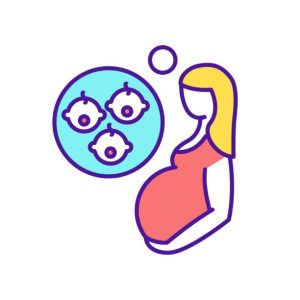Maternity Benefit is a benefit given to the mothers-to-be or the mothers of the newly born with fully paid leave from employment along with other benefits before and after the delivery of the child, with a motive to facilitate the women in taking care of the child.
The Maternity Benefit Act, 1961 (hereinafter referred to as ‘the Act’) was defined to be ‘a beneficial piece of legislation and its object is to ensure the security of tenure for the working woman’ in the case of Shri Swami Vivekanand Shikshan Sansthechya Sevakanchi Sahakari Patsanstha Maryadit v. Kumari Deepa Narayan Jadhav (2016).
The case of Mamta v. Employee State Insurance Corpn. (2014) held that giving birth to and taking care of the child is covered under the fundamental right of the child and the woman and hence the employer shall be held liable to pay maternity benefits.
APPLICABILITY
Under the scope of Section 2(1)(a), the Act applies to all establishments including:
- factories,
- plantations,
- mines,
- shops or establishments covered under the ambit of law having 10 or more than 10 employees. (As provided by the 2017 amendment) This includes the private sector as well.
In the case of Thomas John Muthoot v. Labour Officer (2014) it was held that a firm with only 3 employees will not be covered under the Act.
- government organizations,
- organizations centered by the central government or
- an establishment wherein persons are employed for the exhibition of equestrian, acrobatics, and other performances
NOTE: The Maternity benefit Act shall be applied to any and all establishments having 10 or more than 10 employees.
ELIGIBILITY
In Section 5(2) of the Act, it is mentioned that a woman, to be eligible for the maternity benefits under the Act, has to be employed in the establishment for not less than 80 days in the twelve months immediately preceding the expected delivery of the woman. (The period has been reduced from 160 days to 80 days by the virtue of 2017 amendment)
(Note: This period of 80 days does not apply to any woman who has immigrated to the state of Assam and was pregnant during the immigration)
The ambit Women employee covers all kinds of employment whether direct or through agency or contracts.
In the case of Glem Brook Estate v. Plantation Office (2012), it was held that even the daily wage workers are entitled to Maternity benefits under the scope of the Act.
Maternity benefits and a fully paid leave cannot be denied to contractual employees. This was the decision of the Hon’ble Central Administrative Tribunal in the case of Anuradha Arya v. Govt. Girl Sr. School (2017).
DURATION OF LEAVE
As per the provisions mentioned in the Act, the duration of the maternity leave in different cases is as follows:
- 26 weeks, for a woman with up to 2 surviving children. The woman, at discretion, can take up to 8 weeks of maternity leave before the delivery and the remaining 18 weeks after the delivery.
- 12 weeks, for a woman already having 2 or more children. Herein, the woman, at discretion, can take up to 6 weeks of leave before the delivery and the remaining 6 weeks after the delivery of the child.
- 12 weeks, for a woman who has adopted a child below the age of 3 months from the date of handover of the child.
- 12 weeks, for a commissioning mother, i.e., a mother who puts her embryo in another woman (another woman is called the host/surrogate) from the day of handover of such child.
- 6 weeks, for a woman who has gone through miscarriage from the date of termination of pregnancy, on the production of proof, as mentioned in Section 6 of the Act.
Further, a woman who has gone through a miscarriage but hasn’t worked in the establishment for 160 days in the preceding 12 months can also claim the leave for miscarriage as decided in the matter of Management of Kallayar Estate, Jay Shree Tea and Industries Ltd. v. Chief Inspector of Plantations (1998).
- 2 weeks, for a woman who has gone through Tubectomy (family planning) from the date of the operation, on the production of proof under the ambit of Section 9(A) of the Act.
- 1 month, for women who suffer illnesses arising out of pregnancy, miscarriage, premature birth, delivery, medical termination, or tubectomy along with wages as per maternity benefits.
KIND OF WORK
The women employee cannot be employed to complete tasks of the following nature under the ambit of Section 4 of the Act:
- Work of arduous nature
- Work involving long hours of standing
- Work that is likely to intervene with the pregnancy or the normal growth of the fetus
- Work which is likely to cause her miscarriage
- Work can adversely affect her health.
It was held by the court in the case of MCD v. Female Workers (2000), that pregnant women employees can be compelled to undertake tasks involving hard labor at the time of advanced pregnancy.
BENEFITS PROVIDED
- Monetary Benefits: Under the ambit of Section 5 (1), every woman is entitled to receive maternity benefits calculated at the rate of average daily wage for the period of her actual absence i.e., for the whole of the maternity leave (including the period preceding the delivery, the actual delivery date, and the period post-delivery)
- Nursing Breaks: As per Section 11 of the Act, every woman is entitled to 2 nursing breaks of the prescribed duration for nursing the child until the child turns 15 months old, apart from the rest interval allowed, through her daily course of work.
- Creche Facility: As per Section 11(A) of the Act (added via 2017 amendment) every establishment with more than 50 employees is prescribed to have a creche facility for the baby and the mother should be allowed 4 visits to the creche in a day which shall include the nursing breaks and the rest intervals allowed to her.
- Work From Home: As per Section 5 (5) of the Act (as inserted by the 2017 amendment) if the job profile of the women facilitates, the employer may allow the provision of work from home to such women after the completion of the maternity break. The period and conditions of such work can be mutually decided between the employer and the employee.
- Medical Bonus: The woman is entitled to receive an amount of Rs. 1000 from the employer in case the pre-natal and post-natal care is not provided by the employer at zero cost as mentioned in Section 8(1) of the Act.
- Prevention from dismissal: The Act under the provision of Section 12 makes it unlawful for the employer to dismiss or deprive an employee of claiming maternity benefits as prescribed by the Act. Except in the cases of gross misconduct by the woman employee.
The women employee on being dismissed or deprived of such benefits may, within 60 days from the date of the order being received, file an appeal to the prescribed authority.
PAYMENT OF MATERNITY BENEFITS UNDER DIFFERENT CIRCUMSTANCES
As per the provisions of the act, in cases of death, the maternity benefit will be provided accordingly:
- Wherein both, the mother and child survive then, the maternity benefits will be provided as per 26 weeks.
- In case the woman survives but the child doesn’t even then the maternity benefit of the duration of leave shall be provided. Herein as per Section 7 of the Act, the maternity benefit will be provided to the legal representative or nominee.
- If the mother dies and the child survives, the maternity benefit will still be provided for the child.
- In the case where both, the mother and the child die then the maternity benefit till the time of the death will be provided, which will also include the day of the death.
- In the case where the mother died and the child survived but later died too, the maternity benefit will be provided till the day of the child’s death.
NOTICE

In case of failure of submitting the notice before delivery, the same can be done after the delivery has been done. In case of failure, the women can be deprived of maternity benefits.
RESTRICTIONS AS TO RESIGNATION
As per the provisions of the act, there are no restrictions as to the resignation of the women employee after claiming the maternity benefits under the Act.
PAYMENT OF THE MATERNITY BENEFIT
As per the provisions of Section 6(5) of the Act, the amount for maternity benefits preceding the date of delivery shall be paid in advance and for the period after the delivery, the payment shall be made within 48 hours of production of proof.
COMBINING OF LEAVES
As per the CCS Rules, 1972, for the government servants, maternity leave can be combined with any other kind of leave. Also, the maternity leave does not disturb the course of leaves otherwise.
DISMISSAL OF THE MOTHER
As per Section 12 of the Act, the employer, in case of gross misconduct can dismiss the employee or deprive her of the maternity benefit or the bonus or both by giving an order in writing. The term gross misconduct is not defined in the Act but Section 28 empowers states to decide what prescribes gross misconduct. In the case of National Tobacco Co. of India Ltd. and Ors vs Fourth Industrial Tribunal and Ors (1959) it was observed by the court that gross conduct in itself means dismissal. If there is a case of gross conduct, there will be left no scope for victimization and the employee might not be in a position to challenge the order.
PENALTIES FOR NON-COMPLIANCE / DEFAULT
| S.No. | Section | Default | Penalty |
| 1)
|
Section 21 of the Act.
|
1)Failure in paying benefits or discharge or dismissal of the mother, on account of absence due to maternity, from the employment (apart from the provisions of Section 12 i.e., in cases of Gross Misconduct)
2)Contravention into the provisions of the act by the employer regarding maternity benefit or payment of any other amount and when recovery of such maternity benefit or the amount has not already been made. |
Imprisonment up to 3 months fine up to Rs. 500/- or both
Recovery of such maternity benefit or amount as if it were a fine and the same is paid to the entitled person by the court. |
| 2) | Section 22 of the Act | On-demand made by the inspector if the person fails to produce any registered document or conceals a document or prevents a person from appearing before the inspector | Imprisonment up to 3 months or a fine of Rs. 500/- or both |
CONCLUSION
The Maternity Benefit Act, after all the precedents and amendments, covers the majority aspects of leaves and other benefits to the mothers-to-be to facilitate and help them raise their child(ren) in the very crucial first few months of their life as taking care of the child is a fundamental right of both the child and the mother.
Author: Sanchita Arora – a BBA.LLB Student at SLS (Nagpur), in case of any queries please contact/write back to us via email chhavi@khuranaandkhurana.com or at Khurana & Khurana, Advocates and IP Attorney.




